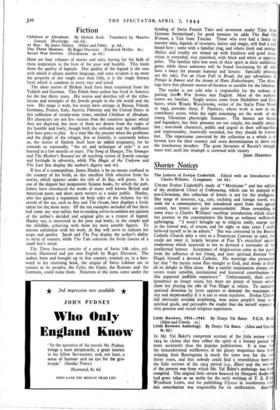Fiction
Children of Abraham. By Sholem Asch. Translated by Maurice Samuel. (Rout ledge. tos. 6d.)
At Bay. By James Hanley. (Faber and Faber. 3s. 6d.) The Three Sneezes. By Roger Duvoisin. (Frederick Muller. 6s.) Soviet War Stories. (Hutchinson. 9s. 6d.) HERE are four volumes of stories and tales, having for the bulk of them inspiration in the lives of the poor and humble. This lends them the quality of legends. One quality of the legend is the ease with which it adopts another language, and since wisdom is no more the property of any single race than folly, it is the single literary form which is common to every race and creed.
The short stories of Sholem Asch have been translated from the Yiddish and German. This Polish born author has lived in America for the last thirty years. His stories and sketches tell of the tribu- lations and triumphs of the Jewish people in the old world and the new. His range is wide, his stories have settings in Russia, Poland, Germany, France, Italy, Austria, Palestine and the United States in this collection of twenty-nine items, entitled Children of Abraham. His characters are not less various than the countries against which they are depicted, but most of them are drawn from the ranks of the humble and lowly, though both the orthodox and the indifferent Jew have parts to play. At a time like the present when the problems and the plight of the refugee, Jew or Gentile, is constantly before us, the stories of Sholem Asch have an added poignancy, for he reminds us repeatedly, " the art and 'technique of exile " is not learned in a few months or years. The Song of Hunger, The Stranger and The Mother's Reward are all touching stories of Jewish courage and fortitude in adversity, while The Magic of the Uniform and The Last Jew display the author's dignity and wit.
If less of a cosmopolitan, James Hanley is by no means confined to the country of his birth, as this excellent little selection from his stories, which appears under the title of At Bay, will prove. It is one of the elegant but inexpensive Sesame books, by which the pub- lishers have introduced the works of many well known British and American poets and short story writers to a wider public. Hanley, who has gained a reputation on both sides of the Atlantic for his novels of the sea, such as Boy and The Ocean, here displays a lively talent for the, short story. Of the ten examples included all but three had come my way earlier, but re-reading serves to confirm my opinion of the author's decided and original gifts as a creator of legend. Hanley too, is interested in the poor and lowly, in the simple and the childlike, achieving with them his most notable figures. To anyone unfamiliar with his work, At Bay will serve to indicate his scope and quality. Jacob and The Fog display the author's ability to write of seamen, while The Tale concerns the lively fancies of a small boy's mind.
The Three Sneezes consists of a series of Swiss folk tales, col- lected, illustrated and put into English by Roger Duvoisin. The author, born and brought up in that country, reminds us, in a fore- word to his charming book, the origins of Swiss folklore are as various as its peoples, the Celts, the Gauls, the Romans and the Germans, could make them. Nineteen of the items come under the
heading of Swiss French Tales and seventeen under Tales from German Switzerland ; for good measure he adds The Bad Old Woman, a Tale from Tincino. Those who ever had a fancy for nursery tales, legends of treasures, fairies and magic, will find a rich hoard here ; some with a familiar ring, and others fresh and strange. Malice and cruelty are mixed up with kindness and good sense, virtue is rewarded, vice punished, with black and white at opposite poles. The familiar tales lose none of their spirit in their unfamiliar guise, while those unknown will be found fascinating by all who have a fancy for peasant humour and fantasy. Specially pleasing are the tales, For an Oven Full of Bread, the gay adventures of Private la ,Ramee and the dream of Hans Kuhschwanz. The draw- ings have that pleasant matter-of-factness so suitable for the fabulous.
The reader is not told who is responsible for the ardours of putting Sovilt War Stories into English. Most of the author's names are familiar. Single stories come from Sholokhov and Gcr- batov, while Wanda Wassilewska, writer of the Stalin Prize Novel in 1943, provides three, F. Panferov, whose work is new to me. contributes seven, while the eight remaining are the work of the young Ukrainian playwright Simonov. The themes are heroic and legendary, but their peasants are too simple, too readily articu- late ; note-book characters, public and urgent in their self-sacrifice and impersonality, frantically recorded, lest they should be forever lost. The impression conveyed by the collection as a whole is of fervent love for their country and stern determination to drive out the treacherous invaders. The great literature of Russia's struggle must wait until her triumph is crowned with victory
JoHN. HAMPSON.


























 Previous page
Previous page